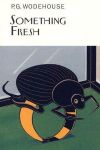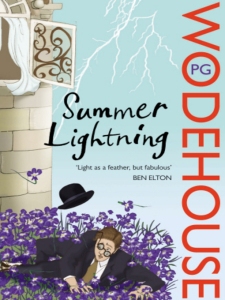“Right ho! What a jolly read! It is a plot-laden novel, but light-hearted, funny and entertaining; moreover, its ending leaves you with a warm-fuzzy feeling.” – Such tedious talking isn’t it? For all the Wodehouse fans here, surely you have all come across such comments on links, but right now I just can’t think of anything more suitable and cleverer to bolster this post. I have been lazy this week, and my brain is jammed all over. But seriously I am really into this novel.
I read Something Fresh as a one of the stories in an omnibus called The World of Blandings. Before that I have read Summer Lightning as my first try on Blandings Castle novels, and found it just as amusing as first reading Jeeves and Wooster. I started to transform myself into a bait on Wodehouse’s writing, and I also prodded myself into reasoning why I love his formula so much. All his characters, no matter great and small, have a common trait, that is often being lunatic and paranoid in their situations that they often end up contriving plans that they think wise and sophisticated; however all their plots would just cram into places where they don’t fit. It happens in the case of Invaluable Efficient Baxter – “a chappie can’t take a step in this bally house without stumbling over that damn feller Baxter”- being all there in the business and often plunges into action; he always crashes and fails. I just could not wait reading Leave it to Psmith and see how he leaves himself a blot by “committing a vile flower-pot crime” against Lord Emsworth!
Apart from the misfortune of Efficient Baxter, I also love how the younger and aristocratic generations are always considered as eyesores to the elders. The Hon. Frederick Threepwood is one of my favourite Nature’s prune in this novel. He, rather than competing against George Emerson for the rapture of Aline Peters, slips over the stairs for the cat and ends up staying in bed reading Gridley Quayle in afternoons. Even the elopement does happen, he just searches for something adequate to say to the deputation to suppress his dream state of mind, just like his father. What I like about the prestigious aristocrats are that they all are not in the prospect of the promise of marriage and wandering about like mad hatters!
As much as the omnipresent playful prunes and plots, I also like the deception bits that prevails throughout the story. Ashe Marson, the writer of the detective stories of Gridley Quayle, is one of the interesting characters in the novel. At the opening chapters we see him doing the Swedish Exercise that arouses all laugh and finger-pointing attitude of other spectators in the hotel in Leicester Square. But who can guess that he would get embroiled in a maelstrom in disguising himself as the valet of the dyspepsia Mr. Peters, and carry out the task of recovering a sought-after Scarab with Joan Valentine who, on the other hand, camouflages as the maid of Aline Peters as Miss Simpson.
Moreover, I have gained more knowledge of the aristocratic household, for example, in where the servants and staff located at dinner, whether of the Steward’s Room or the Servants’ Hall; when the breaking down the social barriers could take place (occurs 2 times, one in abusing Baxter and the elopement case); the servants’ honourable disagreement with another feller on “getting Above Himself”, and also the method in addressing one another,
“Ashe noted as curious fact that while the actual valet of any person under discussion spoke of him almost affectionately by his Christian name, the rest o the company used the greatest ceremony and gave him the title with all respect.”
The ending of this story, so philosophical, just to examine the circle of life bumping and going of the gong you met in life. Such are the aberrations and the funny narration of human nature I love in the stories of Blandings Castle. I can’t wait to read other shorter stories in The World of Blandings!
Excerpt:
Joan was nowhere to be seen. In none of the spots where she might have been expected to be at such a time was she to be found. Ashe had almost given up the search when, going to the back door and looking out as a last chance, he perceived her walking slowly on the gravel drive.
She greeted Ashe with a smile, but something was plainly troubling her. She did not speak for a moment and they walked side by side.
“What is it?” said Ashe at length. “What is the matter?”
She looked at him gravely.
“Gloom,” she said. “Despondency, Mr. Marson – A sort of flat feeling. Don’t you hate things happening?”
“I don’t quite understand.”
“Well, this affair of Aline, for instance. It’s so big it makes one feel as though the whole world had altered. I should like nothing to happen ever, and life just to jog peacefully along. That’s not the gospel I preached to you in Arundel Street, is it! I thought I was an advanced apostle of action; but I seem to have changed. I’m afraid I shall never be able to make clear what I do mean. I only know I feel as though I have suddenly grown old. These things are such milestones. Already I am beginning to look on the time before Aline behaved so sensationally as terribly remote. To-morrow it will be worse, and the day after that worse still. I can see that you don’t in the least understand what I mean.”
“Yes; I do – or I think I do. What it comes to, in a few words, is that somebody you were fond of has gone out of your life. Is that it?”
Joan nodded.
“Yes – at least, that is partly it. I didn’t really know Aline particularly well, beyond having been at school with her, but you’re right. It’s not so much what has happened as what it represents that matters. This elopement has marked the end of a phase of my life. I think I have it now. My life has been such a series of jerks. I dash along – then something happens which stops that bit of my life with a jerk; and then I have to start over again – a new bit. I think I’m getting tired of jerks. I want something stodgy and continuous.
“I’m like one of the old bus horses that could go on forever if people got off without making them stop. It’s the having to get the bus moving again that wears one out. This little section of my life since we came here is over, and it is finished for good. I’ve got to start the bus going again on a new road and with a new set of passengers. I wonder whether the old horses used to be sorry when they dropped one lot of passengers and took on a lot of strangers?”
A sudden dryness invaded Ashe’s throat. He tried to speak, but found no words. Joan went on:
“Do you ever get moods when life seems absolutely meaningless? It’s like a badly-constructed story, with all sorts of characters moving in and out who have nothing to do with the plot. And when somebody comes along that you think really has something to do with the plot, he suddenly drops out. After a while you begin to wonder what the story is about, and you feel that it’s about nothing – just a jumble.”
“There is one thing,” said Ashe, “that knits it together.”
“What is that?”
“The love interest.”
Their eyes met and suddenly there descended on Ashe confidence. He felt cool and alert, sure of himself, as in the old days he had felt when he ran races and, the nerve-racking hours of waiting past, he listened for the starter’s gun. Subconsciously he was aware he had always been a little afraid of Joan, and that now he was no longer afraid.
“Joan, will you marry me?”
Her eyes wandered from his face. He waited.
“I wonder!” she said softly. “You think that is the solution?”
“Yes.”
“How can you tell?” she broke out. “We scarcely know each other. I shan’t always be in this mood. I may get restless again. I may find it is the jerks that I really like.”
“You won’t!”
“You’re very confident.”
“I am absolutely confident.”
“‘She travels fastest who travels alone,'” misquoted Joan.
“What is the good,” said Ashe, “of traveling fast if you’re going round in a circle? I know how you feel. I’ve felt the same myself. You are an individualist. You think there is something tremendous just round the corner and that you can get it if you try hard enough. There isn’t – or if there is it isn’t worth getting. Life is nothing but a mutual aid association. I am going to help old Peters – you are going to help me – I am going to help you.”
“Help me to do what?”
“Make life coherent instead of a jumble.”
“Mr. Marson – “
“Don’t call me Mr. Marson.”
“Ashe, you don’t know what you are doing. You don’t know me. I’ve been knocking about the world for five years and I’m hard – hard right through. I should make you wretched.”
“You are not in the least hard – and you know it. Listen to me, Joan. Where’s your sense of fairness? You crash into my life, turn it upside down, dig me out of my quiet groove, revolutionize my whole existence; and now you propose to drop me and pay no further attention to me. Is it fair?”
“But I don’t. We shall always be the best of friends.”
“We shall – but we will get married first.”
“You are determined?”
“I am!”
Joan laughed happily.
“How perfectly splendid! I was terrified lest I might have made you change your mind. I had to say all I did to preserve my self-respect after proposing to you. Yes; I did. How strange it is that men never seem to understand a woman, however plainly she talks! You don’t think I was really worrying because I had lost Aline, do you? I thought I was going to lose you, and it made me miserable. You couldn’t expect me to say it in so many words; but I thought – I was hoping – you guessed. I practically said it. Ashe! What are you doing?”
Ashe paused for a moment to reply.
“I am kissing you,” he said.
“But you mustn’t! There’s a scullery maid or somebody looking through the kitchen window. She will see us.”
Ashe drew her to him.
“Scullery maids have few pleasures,” he said. “Theirs is a dull life. Let her see us.”









You must be logged in to post a comment.